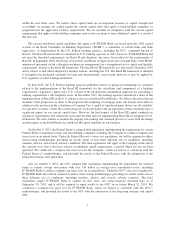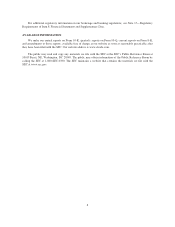eTrade 2012 Annual Report Download - page 20
Download and view the complete annual report
Please find page 20 of the 2012 eTrade annual report below. You can navigate through the pages in the report by either clicking on the pages listed below, or by using the keyword search tool below to find specific information within the annual report.at this time all of the specific impacts the Dodd-Frank Act and the yet-to-be-written rules and regulations may
have on us. However, given that the legislation is likely to materially change the regulatory environment for the
financial services industry in which we operate, we expect at a minimum that our compliance costs will increase.
If we fail to comply with applicable securities and banking laws, rules and regulations, either domestically or
internationally, we could be subject to disciplinary actions, damages, penalties or restrictions that could
significantly harm our business.
The SEC, FINRA and other self-regulatory organizations and state securities commissions, among other
things, can censure, fine, issue cease-and-desist orders or suspend or expel a broker-dealer or any of its officers
or employees. The OCC and Federal Reserve may take similar action with respect to our banking and other
financial activities, respectively. Similarly, the attorneys general of each state could bring legal action on behalf
of the citizens of the various states to ensure compliance with local laws. Regulatory agencies in countries
outside of the U.S. have similar authority. The ability to comply with applicable laws and rules is dependent in
part on the establishment and maintenance of a reasonable compliance function. The failure to establish and
enforce reasonable compliance procedures, even if unintentional, could subject us to significant losses or
disciplinary or other actions.
The Company recently completed a review of order handling practices and pricing for order flow between
E*TRADE Securities LLC and G1 Execution Services, LLC (G1X). The purpose of the review was to examine
whether E*TRADE Securities LLC was providing “best execution” of customer orders as well as otherwise
complying with applicable securities laws and dealing appropriately with its market making affiliate under
applicable federal bank regulatory standards. The review was conducted by separate firms of outside broker-
dealer and bank regulatory counsel. The firms’ reports identified shortcomings in the Company’s historical
methods of measuring best execution quality and suggested additions and changes to the Company’s standards,
processes and procedures for measuring execution quality and for monitoring and testing transactions between
the Bank and non-Bank affiliates to ensure compliance with relevant regulations. The Company is in the process
of implementing the recommended changes, and expects to complete the process in the near future. Banking
regulators and federal securities regulators were regularly updated during the course of the review. The
Company’s regulators may initiate investigations into its historical practices which could subject it to monetary
penalties and cease-and-desist orders, which could also prompt claims by customers of E*TRADE Securities
LLC. Any of these actions could materially and adversely affect the Company’s market making and trade
execution businesses.
If we do not maintain the capital levels required by regulators, we may be fined or even forced out of business.
The SEC, FINRA, the OCC, the Federal Reserve and various other regulatory agencies have stringent rules
with respect to the maintenance of specific levels of regulatory capital by banks and net capital by securities
broker-dealers. E*TRADE Bank is subject to various regulatory capital requirements administered by the OCC,
and E*TRADE Financial Corporation will, for the first time, become subject to specific capital requirements
administered by the Federal Reserve. Failure to meet minimum capital requirements can trigger certain
mandatory, and possibly additional discretionary actions by regulators that, if undertaken, could harm E*TRADE
Bank’s and E*TRADE Financial Corporation’s operations and financial statements.
E*TRADE Bank must meet specific capital guidelines that involve quantitative measures of E*TRADE
Bank’s assets, liabilities and certain off-balance sheet items as calculated under regulatory accounting practices.
Quantitative measures established by regulation to ensure capital adequacy require E*TRADE Bank to maintain
minimum amounts and ratios of total and Tier 1 capital to risk-weighted assets and of Tier 1 leverage. To satisfy
the capital requirements for a “well capitalized” financial institution, E*TRADE Bank must maintain higher total
and Tier 1 capital to risk-weighted assets and Tier 1 leverage ratios. E*TRADE Bank’s capital amounts and
classification are subject to qualitative judgments by the regulators about the strength of components of its
capital, risk weightings of assets, off-balance sheet transactions and other factors. Any significant reduction in
17
























